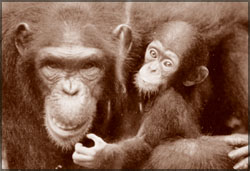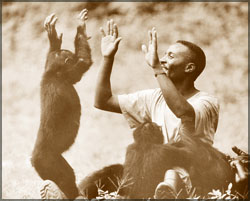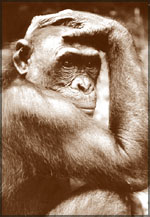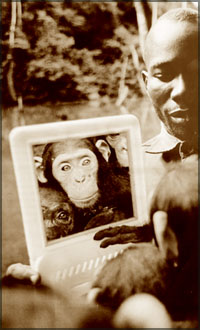Meet the family
The "Morning Calm" in flight magazine of the
Korean Air line carried an interesting feature article on chimpanzees
that made me to share it with the readers. Most interesting was the
paintings done by the chimps and at what price they are sold. Another
feature is how the chimps face stress. I quote below from the original
article.
by Nimal Sedera
The human blueprint is not the
intractable mystery it once was. Though many of the links between our
DNA and the finished human being are not yet clear, the study of our genes does
confirm one thing: We humans are fundamentally no different to any other
creature on Earth.
the finished human being are not yet clear, the study of our genes does
confirm one thing: We humans are fundamentally no different to any other
creature on Earth.
And there are some with which we are especially close - chimpanzees.
Homo sapiens share well over 90 percent of our genes with chimps, and
humans and chimpanzees diverged from a common ancestor just a few
million years ago.
Yet there's so much more to it than microscopic genes. Chimpanzees,
like humans, inhabit a complex social world of reciprocity, competition
and loyalty. They use tools to retrieve food, clean themselves and
dominate their adversaries. They are self-aware. Scientists have even
struggled to teach chimps sign language, with some success."
"From Art to War Culture
among chimps can even go beyond tasks for survival. Desmond Morris, a
surrealist
 painter
as well as a famed expert on primates, exhibited the abstract
impressionist artwork of Congo, a young chimpanzee, in the 1950s.
Picasso is said to have hung one of Congo's pieces on his wall, and last
year some of the chimp's work was sold in London for over US$26,000,
outselling the auctions's Warhol and Renoir." painter
as well as a famed expert on primates, exhibited the abstract
impressionist artwork of Congo, a young chimpanzee, in the 1950s.
Picasso is said to have hung one of Congo's pieces on his wall, and last
year some of the chimp's work was sold in London for over US$26,000,
outselling the auctions's Warhol and Renoir."
"In the wild, chimpanzees live in fluctuating groups of several
dozen. Fertile female give birth about once every five years, and chimp
children don't willingly leave their mothers until the age of three or
four. The emotional bond between parent and child, and between siblings,
lasts for life."
"Chimpanzees and humans also have in common the will to wage war. In
1974 in Gombe, near the coast of lake Tanganyika in Tanzania, Jane
Goodall, perhaps the world's best-known chimpanzee expert, and her team
of researchers observed a "four-year war" in which one group of
chimpanzees systematically eliminated every last member of another, in a
conflict as vicious and brutal as any human struggle over territory or
pride might be."
  "Humanism
But These apes also grieve, and fall into depression. one
month after the death of Flo, an ape Goodall observed for many years,
her adult son Flint stopped caring for himself and died of a weak immune
system. "Humanism
But These apes also grieve, and fall into depression. one
month after the death of Flo, an ape Goodall observed for many years,
her adult son Flint stopped caring for himself and died of a weak immune
system.
Ai Ai, a 27 year-old chimp in a Chinese zoo, began to smoke stray
cigarettes when her mate died in 1989. Another Chinese chimp took up
cigarettes, her keeper said, because her elderly mate couldn't meet her
sexual demands".
"With such human-like behaviour, and such similar genetic codes, some
bioethics say the logical next step is to afford chimpanzees the human
rights they deserve.
At the very least, chimpanzees have much left to teach us, not only
about the development and evolution of the human mind and body, but more
urgently about the precursor to the AIDS virus, which infected African
chimps before it mutated and moved to humans. And perhaps it is Jane
Goodall - who began her academic career by insisting her scientific
writings use "he, "she" and "who" rather than "it" and "which" to refer
to chimps who puts it best "how should we relate to beings who look into
mirrors and see themselves as individuals, who mourn companions and may
die of grief, who have a consciousness of self?
"Don't they deserve to be treated with the same sort of consideration
we accord to other highly sensitive beings: ourselves?" |
